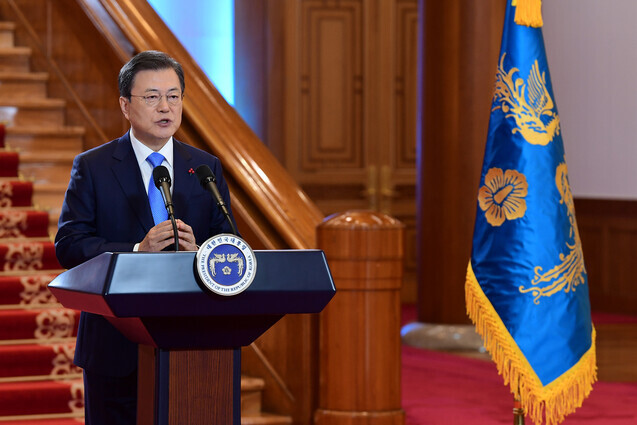Moon stresses inter-Korean cooperation on COVID-19, reaffirms willingness to meet with Kim Jong-un
전체 맥락을 이해하기 위해서는 본문 보기를 권장합니다.
With North Korea having already responded negatively to Moon's past proposals for cooperation on disease control, it remains uncertain how effective this approach will be. At the recent 8th Congress of the Workers' Party of Korea (WPK), North Korean leader Kim Jong-un commented, "The south Korean authorities are now giving an impression that they are concerned about the improvement of north-south relations by raising such inessential issues as cooperation in epidemic prevention and humanitarian field and individual tourism."
"The two Koreas should join hands and together prove that a peaceful and prosperous Korean Peninsula can also contribute to the international community," he continued, stressing that "a peaceful Peninsula free of war and nuclear weapons is what we are obliged to pass down to the Korean people and posterity."
이 글자크기로 변경됩니다.
(예시) 가장 빠른 뉴스가 있고 다양한 정보, 쌍방향 소통이 숨쉬는 다음뉴스를 만나보세요. 다음뉴스는 국내외 주요이슈와 실시간 속보, 문화생활 및 다양한 분야의 뉴스를 입체적으로 전달하고 있습니다.

In his New Year’s address on Jan. 11, South Korean President Moon Jae-in announced plans to “make our final effort to achieve a major breakthrough in the stalled North Korea-US talks and inter-Korean dialogue.”
Moon’s remarks signal his commitment to resuming inter-Korean dialogue ahead of US President-elect Joe Biden’s inauguration on Jan. 20.
Moon also shared his hope that “the process of dealing with COVID-19 will initiate mutual benefits and peace” with Pyongyang.
“I would like the two Koreas to participate in regional dialogues about the Northeast Asia Cooperation Initiative for Infectious Disease Control and Public Health as well as the initiative for Korea-ASEAN comprehensive healthcare cooperation,” he continued.
Moon also called for increasing inter-Korean communication through a joint response to the COVID-19 pandemic.
“Collaboration in response to COVID-19 can expand to cooperation on issues directly connected to the safety and survival of South and North Koreans such as infectious livestock diseases and natural disasters,” he noted.
“The broader cooperation expands, the further we can move along the path toward unification,” he stressed.
With North Korea having already responded negatively to Moon’s past proposals for cooperation on disease control, it remains uncertain how effective this approach will be. At the recent 8th Congress of the Workers’ Party of Korea (WPK), North Korean leader Kim Jong-un commented, “The south Korean authorities are now giving an impression that they are concerned about the improvement of north-south relations by raising such inessential issues as cooperation in epidemic prevention and humanitarian field and individual tourism.”
In his New Year’s address, Moon also stressed, “The key driving force of the Korean Peninsula peace process is dialogue and mutually beneficial cooperation.”
“Our determination to meet at any time and any place and talk even in a contact-free manner remains unchanged,” he said, clearly showing his commitment to resuming inter-Korean dialogue.
“The two Koreas should jointly fulfill all the agreements made together to date — especially the three principles of mutual security guarantees, common prosperity and zero tolerance for war. If we can draw support from the international community in the process, the door to a community of peace, security and life will open wide, not just on the Peninsula but also in East Asia,” he continued.
He also emphasized the importance of denuclearizing the Korean Peninsula.
“This year marks the 30th anniversary of South and North Korea simultaneously joining the United Nations,” he noted.
“The two Koreas should join hands and together prove that a peaceful and prosperous Korean Peninsula can also contribute to the international community,” he continued, stressing that “a peaceful Peninsula free of war and nuclear weapons is what we are obliged to pass down to the Korean people and posterity.”
By Park Byong-su, senior staff writer
Please direct comments or questions to [english@hani.co.kr]
Copyright © 한겨레. 무단전재 및 재배포 금지.
- 6살 숨지게 한 ‘낮술 운전’ 징역 8년…“구형보다 약한 처벌”
- 괌 침입종 뱀의 비결, 올가미로 전봇대 오르기
- 막오른 선거…안철수·나경원 ‘잰걸음’, 스텝 꼬인 오세훈
- “이루다 개발사, 연인 카톡 대화 수집하고는 돌려보며 웃었다”
- [영상] 그물에 갇혀 19일, 피 흘리며 죽어간 어린 밍크고래
- ‘미래에 대한 책임’ 첫 소송…정부 이긴 환경단체, 석유회사 조준
- “소행성 궤도를 바꿔라”…아마겟돈 실험이 시작된다
- 여의봉처럼 스마트폰-태블릿 변화무쌍…‘LG 롤러블’ 깜짝 공개
- ‘그날’도 아니고 ‘마법’도 아니고 ‘생리’입니다
- ‘연쇄 이동’ 여자배구 세터 ‘춘추전국시대’